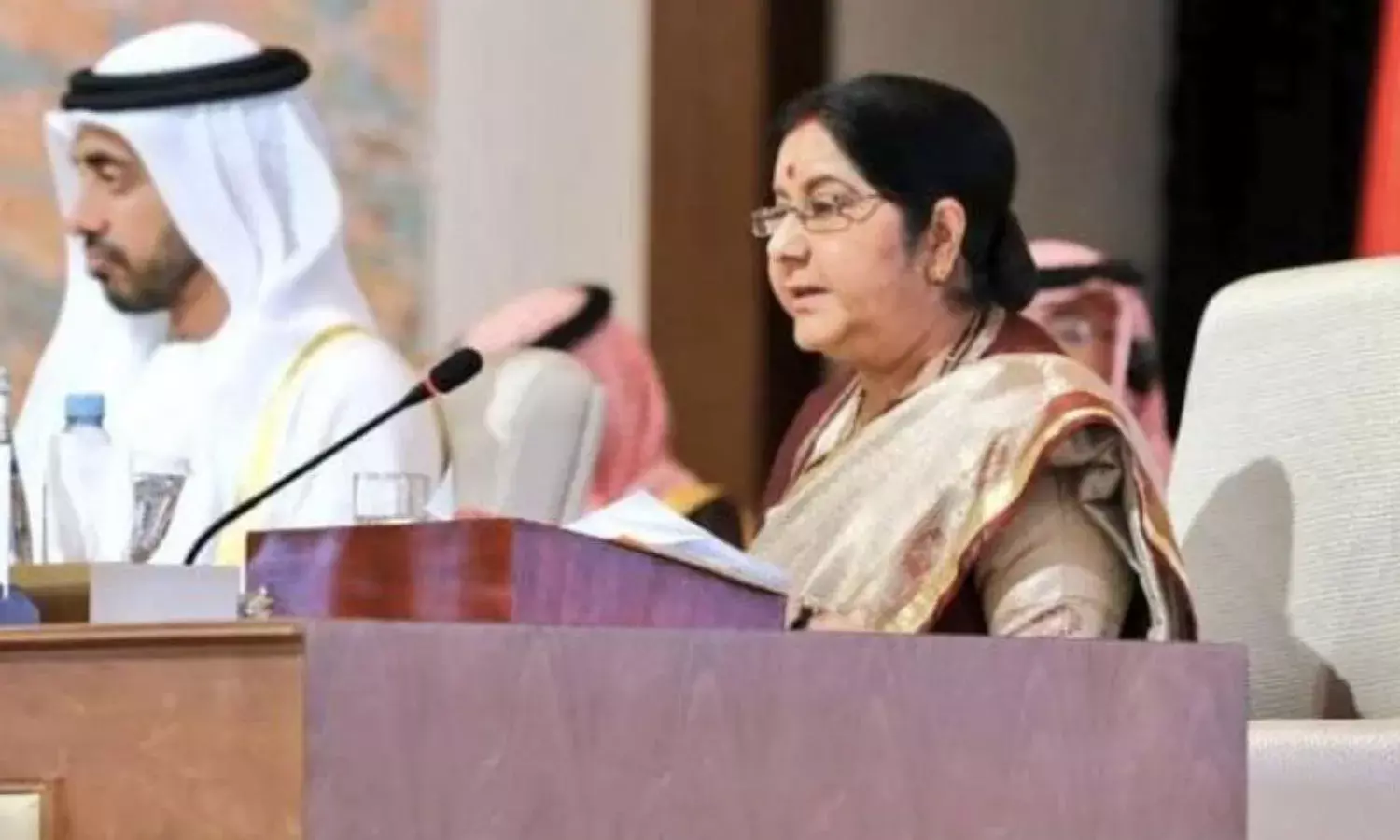Indian Diplomacy Hit as OIC Targets India on Kashmir
What did Minister Sushma Swaraj achieve as the ‘guest of honour’ at the OIC

NEW DELHI: What did Minister of External Affairs Sushma Swaraj achieve as the ‘guest of honour’ at the 46th session of the Council of Ministers of the Organisation of Islamic Cooperation meet at Abu Dhabi?
Little it would seem as India’s OIC diplomacy suffered a major setback within a day after Swaraj addressed the plenary. The Foreign Ministers session passed a resolution hitting out at what it called "intensified Indian barbarities since July 2016", "Indian terrorism" and "illegal detentions and disappearances" in Jammu and Kashmir.
This after, the government hailed the OIC invitation as a “welcome recognition of the presence of 185 million Muslims in India and of India’s contribution to the Islamic world.”
Pakistan objected and stayed away from the Foreign Ministers meeting, that was seen as another feather in the cap of the new invitee India. However, despite this the OIC foreign ministers adopted a strongly worded resolution on Kashmir, reminding the global community to implement the UN Security Council resolutions on the Kashmir “dispute.”
In its first reaction to the resolution, India's Ministry of External Affairs said, "Our stand is consistent and well known. We reaffirm that Jammu and Kashmir is an integral part of India and is a matter strictly internal to India." A senior diplomat said that the OIC statement should have been expected, as it is consistent with its position over the years. It is not still clear what gains Indian diplomacy has made on this front, except lend further legitimacy to the OIC and hence the resolution in itself that also called for restraint, and urged both countries to work for peace.
New Delhi projected the invite as a coup of sorts as it was another of those firsts that the government revels in. India had been working for full membership of the OIC, and over the years had managed to reduce the significance of the organisation within the country and the global community. However, this time the invitation that led a sulking Pakistan to boycott the plenary, led to unofficial briefings to the media here where the relevance of the OIC was highlighted, and the spotlights turned back on the organisation. New Delhi was clear that it wanted to be a member, and the invite to attend as a “guest of honour” was a step in the right direction. The Ministers speech against terrorism was highlighted, but within 24 hours the resolution has poured cold water over these diplomatic efforts. New Delhi’s response remains tame as it is not in a position to attack the partisan nature of an Organisation that it has itself given full legitimacy to.
Significantly the OIC has also elected Pakistan as a member of its Independent Permanent Human Rights Commission from the Asian region, in supposed acknowledgement of Pakistan’s “constructive contribution to human rights discourse, norms and policies”.
The resolution came a day after Swaraj had urged the OIC members to act together to combat terrorism. And without referring to Pakistan had however made it clear, "If we want to save humanity, we must tell the states who provide shelter and funding to terrorists, to dismantle the infrastructure of the terrorist camps and stop providing funding shelter and funding to the terror organisations based in that country."
The OIC resolution adopted on Saturday attacked India for “indiscriminate use of force against innocent Kashmiris”. It praised Pakistan Prime Minister Imran Khan for sending back the Indian Air Force fighter pilot Abhinandan Varthaman. Pakistan’s Foreign Office that has hailed the resolutions as a victory issued a press release carried by its media maintaining that the OIC meet had “supported” Pakistan’s position on Kashmir.
There were sufficient signals before the OIC Foreign Ministers met that should have indicated to India that it was going to be business as usual for the OIC that has been at loggerheads with New Delhi’s position. In fact it was a hardening of position, with the OIC generally dismissed by India as a non representative body, being given spotlight publicity by the high level government presence. Clearly there had been no backdoor diplomacy to tone down the Kashmir resolution by New Delhi, or if there had been it had not succeeded as the following events indicate.
In the run up to the meet, the Secretary General of OIC Dr Yousef Al-Othaimeen had inaugurated a Kashmir Black Day ceremony at Jeddah with member nations, including Pakistan of course, present. He had spoken of the OICs continued support to the Kashmiris to exercise their “right to self determination” and that the OIC “will continue to advocate the Kashmiri issue at every international forum.”
A couple of days before Minister Swaraj addressed the plenary, the OIC contact group held an emergency meeting and issued a statement that made its position very clear on the eve of the 46th Session of the Council of Foreign Ministers.
The meeting was chaired, on behalf of the Secretary General by Assistant Secretary General Amb Hameed A. Opeloyeru who In his opening remarks, strongly condemned the “recent wave of repression, brutal killing of innocent Kashmiri civilians by the Indian occupied forces, frequent incidents of rape especially of minor girls.”
According to the OIC he reiterated “the principled position on supporting the people of Jammu and Kashmir in achieving their legitimate rights, including the right of self-determination.”
And that the “ conflict shall be resolved in accordance with the aspiration of the Kashmiri people and the OIC and United Nations resolutions”.
And as if this was not enough the Contact Group appreciating Pakistan's “offer of peace” “called on the OIC and the UN Secretaries General to use their good offices to put an end to the dangerous escalation by India, which threatens regional peace and security. It was underscored that priority should be given to peace and dialogue.” (as per the OIC official website)



